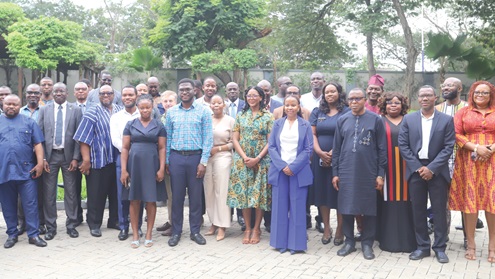Financial inducement, political pressure and threats of removal from office have been identified as the dominant tools used to capture democracy across 10 African countries, including Ghana.
A study by the Ghana Centre for Democratic Development (CDD-Ghana) and other collaborators across in those countries, mentioned presidents and chief executives of state institutions as the main perpetrators of democracy capture in Africa.
As explained by Gyimah-Boadi (2021: 58), democracy capture occurs when "a few individuals or sections of a supposedly democratic polity are able to systematically appropriate to themselves institutions and processes, as well as dividends of democratic governance".
The Democracy Capture Index (DCI) report, which was launched in Accra yesterday, however, said apart from executive control, there were influential actors outside of the formal political system who also acted as perpetrators of democracy capture.
Context
As part of the study by CDD-Ghana, a combined total of 370 agencies were covered across six types of institutions in the 10 countries.
The six institutions covered by the assessors were vertical accountability, horizontal accountability, implementing, policy-making, enforcement and independent regulatory agencies.
The study was conducted in Benin, Botswana, DR Congo, Ghana, Kenya, Mozambique, Nigeria, Senegal, South Africa, and Tanzania.
Findings
A Democracy and Governance fellow at CDD-Ghana, Dr John Osae-Kwapong, who presented the findings of the report, explained that the study explored the extent to which different actors within the democratic spaces in the 10 countries had influence over democratic institutions.
He said overall, 60 per cent of institutions and agencies were under capture by the executive (President, ministers, CEOs).
The report showed that 40 per cent of the institutions were free from state capture, 32 per cent sometimes acted on behalf of the main perpetrator, while in 24 per cent of the agencies, they regularly acted on behalf of the perpetrator.
The study further showed that in four per cent of the institutions, most actions were controlled by the perpetrator.
“One key finding in this report is that it is executive officials in executive branch institutions who are trying to undermine other kinds of agencies and prevent them from doing their work.
“But in other cases, you also see that it is either an influential person, the political party or some business person,” he said.
Rationale
Dr Osae-Kwapong said that ultimately, the different ways or mechanisms that perpetrators employed to try and undermine institutions and democracy were for two reasons – “either they want greater partisan control or they are looking for some material gain”.
“They want to get some material gains from state resources,” he added.
The report also showed that majority of state institutions were frequently under pressure to do things or make decisions on behalf of some kinds of external actors or perpetrators.
“When you put all the institutions together, our country assessors gave us a combined total of 370 institutions across 10 different countries; and 60 per cent of those institutions experience some level of capture,” Dr Osae-Kwapong said.
The governance expert said it was important for Ghana to draw useful lessons from the report and look inwardly at which state or democratic institutions were very vulnerable to democratic capture.
He also said the country needed to take advantage of the ongoing constitutional review process to make reforms that would ensure that state institutions were not overly manipulated by the executive or influential persons for personal gains.

